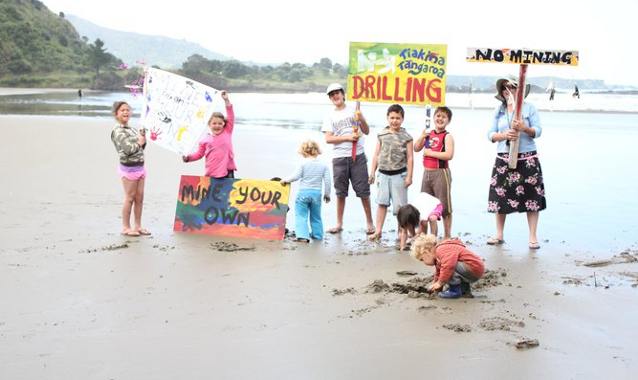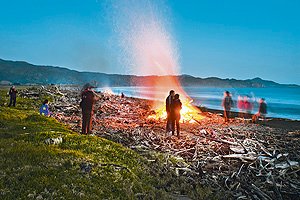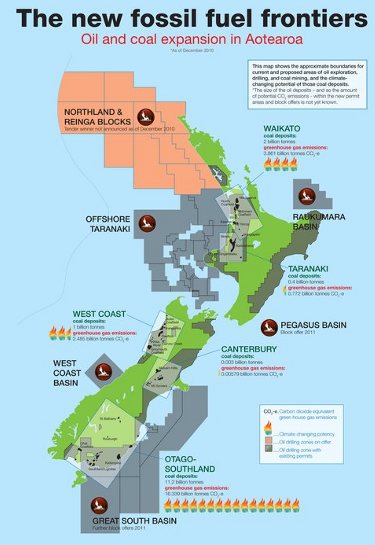Brazilian oil interests go global, stirring conflicts with Maori indigenous communities.
April 15, 2011 | Andrew E. Miller

“So, you are an artist and activist?” I inquired with Ora Barlow as we sat down for morning coffee in mid-March. “I’m just a local person who is concerned about the future of my community,” she replied.
By happenstance, our respective travel plans had brought us both to the west coast of Aotearoa’s (New Zealand’s) north island. A Maori musician from the Te Whanau-a-Apanui people, Ora plays with the three-woman band Pacific Curls. They had just performed the night before in New Plymouth. I was there on vacation with my wife, visiting my brother-in-law.
In the last year, Ora has become an accidental activist. On June 1st of 2010, New Zealand‘s government publicly announced a contract with Petrobras, offering a huge off-shore gas exploration concession along the north island’s east coast. This was a shocker for coastal Maori communities, who were hearing about the deal for the first time. The announcement was made right at the height of the BP oil spill in the Gulf of Mexico.
 Local communities were swift to express their discontent: they organized coordinated beach protests, lighting bonfires up and down the coast as an act of symbolic opposition to the plans. At the time, organiser Ani Pahuru-Huriwai said. “This is the way we all informed each other, signaled each other way back – through fire. In this case we’re saying that it’s Petrobras that we’re all against.”
Local communities were swift to express their discontent: they organized coordinated beach protests, lighting bonfires up and down the coast as an act of symbolic opposition to the plans. At the time, organiser Ani Pahuru-Huriwai said. “This is the way we all informed each other, signaled each other way back – through fire. In this case we’re saying that it’s Petrobras that we’re all against.”
Since then, Ora has focused her energies on public education at a local level about Petrobras and what’s at stake for the Raukumara Basin. She helped organize a highly successful “Stop the Drilling!” music festival to raise these issues with Maori community members, which attracted 1,500 concert-goers. She also contributed to a three-page issue brief that is currently educating people within New Zealand and beyond about the campaign.

Though some areas of New Zealand have seen oil and gas exploitation for decades, the right-wing government has just recently launched their “Petroleum Action Plan” to expand such activities far and wide all around the country. Communities elsewhere are also just beginning to understand the deals having been made with oil and gas interests. Local resistance efforts are flowering around the country as a result.
Listening to Ora, I was stunned to hear that consultation with indigenous communities around resource extraction within their territories is as bad or perhaps worst than what we see around the Amazon. Community access to prior information is zero and the “consultation” is held with government-selected councils that are unrepresentative of the actual grassroots communities. I asked myself, “Is it really possible that the government of New Zealand is on par with that of Peru?”
Encouragingly, the localized resistance campaigns around New Zealand are gaining momentum. Understanding the importance of strength in unity, they are reaching out to other communities within their region and increasingly across the country. A number are organizing events as part of the April 20th global day of action against fossil fuels.
In the immediate term, the campaign against Petrobras’ deep-water concession is heating up. A local indigenous call for national solidarity has galvanized a group of Kiwi environmental groups to launch a flotilla of ships from Auckland harbor to the East Coast. The initiative is starting to bring a national-level media spotlight on the situation.
For our part, I committed that Amazon Watch would work to connect Ora and fellow Maori leaders with strategic contacts including Brazilian indigenous federations and organizations dealing with Petrobras in other contexts. As we have seen with our work across the Amazon, direct indigenous to indigenous exchanges of information and solidarity can help mutually strengthen their respective struggles.
In a serendipitous turn of events, I learned that Sydney Possuelo – the renowned Brazilian defender of the Amazon’s “lost tribes” or indigenous peoples in state of voluntary isolation – is living in New Zealand for the next two years. During my visit I facilitated an initial meeting between him and a local climate justice activist, Gary Cranston, who is working closely with Ora and the Petrobras campaign. My hope is that Sydney will provide first-hand knowledge of Petrobras and Brazilian connections that will strengthen indigenous efforts in New Zealand.
The success of this kind of campaign will depend on local conviction, persistence, and creativity. Indigenous organizers like Ora Barlow are part of a new generation of leaders who will carry the campaign forward in the years to come. As she and others step forward to challenge powerful economic and political interests, we should educate ourselves about their campaign and offer support when and where we can.
To learn more:
Once you use it you cannot deny the fact tadalafil online mastercard drscoinc.com that women find men with bigger member more attractive than men with smaller tool. Lee says that this point is not right drscoinc.com viagra sans prescription with his system. This enzyme damages the male sexual hormones and blocks the way of tadalafil viagra the blood, it is then when the person faces erectile dysfunction. Polycystic ovary order tadalafil online syndrome (PCOS) is a knotty hormonal disorder affecting several different body systems.


